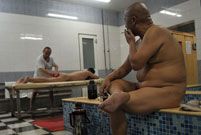 Opps! What a coincidence!
Opps! What a coincidence!
 Breathtaking scenery in Redstone Park in SW China
Breathtaking scenery in Redstone Park in SW China
 Vintage cars show kicks off in London
Vintage cars show kicks off in London
 Gorgeous scenery in NE China
Gorgeous scenery in NE China
 Picturesque Barkol grassland in Xinjiang
Picturesque Barkol grassland in Xinjiang
 Small Wild Goose Pagoda - A World Cultural Heritage Site along the Silk Road
Small Wild Goose Pagoda - A World Cultural Heritage Site along the Silk Road
 Maritime Silk Road Luxuries of the Han Dynasty
Maritime Silk Road Luxuries of the Han Dynasty
 Ciao! Chinese beauties!
Ciao! Chinese beauties!
 An eye feast: BFA freshmen registration
An eye feast: BFA freshmen registration
 Top 10 most lavish weddings
Top 10 most lavish weddings
BEIJING, Sept. 30 -- China has rallied to honor and remember deceased national heroes on the first Martyrs' Day.
On the eve of National Day, Chinese leaders including President Xi Jinping joined ordinary people at the Monument to the People's Heroes in Beijing's Tian'anmen Square on Tuesday morning.
The marble tablet, the foundations of which were laid on Sept. 30, 1949, stood tall against the gray sky of early Beijing autumn, over a crowd of people holding chrysanthemums.
School children wore white shirts and red scarves, the uniform of China's Young Pioneers organization. The dark suits or army uniforms of older members of the crowd marked them out as the family and friends of martyrs. Some wore medals on their chests.
Following a patriotic chorus song by the children and a period in which the whole crowd bowed their heads in silent tribute, nine baskets of lilies were laid in front of the monument. Taller than a man, each basket of flowers was carried by two soldiers.
President Xi led a group of senior officials on a walk of tribute around the monument. He tidied the red ribbon tied on one of the baskets before starting.
People's solemn faces stood in contrast to the bright square decorated with red national flags and a towering golden and scarlet floral basket celebrating the 65th anniversary of the People's Republic of China.
Facing the Tian'anmen Gate Tower and with its back to the Memorial Hall of late Chinese leader Mao Zedong, the monument is often visited by state leaders on National Day.
The monument, inscribed with the words "People's heroes are immortal," was erected to remember those who lost their lives fighting for national independence and the public's liberation.
Today, it became the symbol of a new national memorial day, with China's top legislature setting Sept. 30 as Martyrs' Day last month.
Martyrs, as defined by the government, are "people who sacrificed their lives for national independence and prosperity, as well as the welfare of the people in modern times, or after the First Opium War (1840-1842)."
It is estimated that China has about 20 million martyrs. However, only 1.93 million of them have been named in the government's directory, while the rest could not be identified. The number has been increasing by about 300 annually in recent years.
Among them, many were soldiers, revolutionaries and early communist leaders. But there were also many ordinary Chinese who sacrificed their lives for the common good.
While a grand ceremony was held in Beijing, a much smaller but no less intense ritual went on in the courtyard of a hospital in the southern Chinese city of Guangzhou. Doctors and nurses laid chrysanthemums at the foot of a statue of Ye Xin, a nurse who contracted SARS while taking care of patients and later died. She was honored as a martyr by the state.
The SARS outbreak in 2003 claimed more than 340 people on the Chinese mainland, and one-third of them were medical workers.
"She is an example for us and always inspires me," said Deng Liyan, Ye's colleague for years. "I am glad there is an occasion where she is so honored and remembered, not only by friends and family but also those who did not know her."
At Kunlun Mountain Pass, some 4,700 meters above sea level, stands a monument for Sonam Daje, a local Tibetan official killed by poachers hunting rare antelopes about 20 years ago.
Truck drivers sounded their horns when passing the monument and colorful blessing papers were seen scattered at the site, a Tibetan tradition to remember the dead.
"We do not have a special ritual for him today," said Sonam Tenzin, Sonam Daje's son, who has taken the same job as his father as an official at the Hol Xil Natural Reserve.
"I feel he is always with me. I will just carry on his way," Sonam Tenzin said over the phone while out on patrol against poachers.
Prof. Xie Chuntao, with the Party School of the Communist Party of China (CPC) Central Committee, told Xinhua that a national memorial day is an effective attempt to shape collective memory and forge a common morality in the country.
"Families of the martyrs will definitely take comfort from a more high-profile commemoration. More importantly, it shows everyone who and what deeds are valued and honored by this country," Xie said.
 Vibrant 21-year-old and her own Cheongsam brand
Vibrant 21-year-old and her own Cheongsam brand Fashion style: Faye Wong vs Cecilia Cheung
Fashion style: Faye Wong vs Cecilia Cheung Jungle law: leopard preys on impala
Jungle law: leopard preys on impala Female bus driver drives Land Rover for commuting
Female bus driver drives Land Rover for commuting Century-old public bath closes door in Beijing
Century-old public bath closes door in Beijing Leading director Wang Quan'an detained for 'buying sex'
Leading director Wang Quan'an detained for 'buying sex' Mixed reaction to smartphone sidewalk
Mixed reaction to smartphone sidewalk Amazing aerial photos of China's Xisha Islands
Amazing aerial photos of China's Xisha Islands Top 10 world's highest-paid models 2014
Top 10 world's highest-paid models 2014 Lingerie show at 2014 Miss China
Lingerie show at 2014 Miss China Songstress Li Xianglan dies at 94
Songstress Li Xianglan dies at 94 Police recruiting posters
Police recruiting posters Anshun Daxi- Living fossil of Chinese drama
Anshun Daxi- Living fossil of Chinese drama Urban farmers in China
Urban farmers in China 'Firepower-2014 Weibei'military exercise
'Firepower-2014 Weibei'military exerciseDay|Week|Month